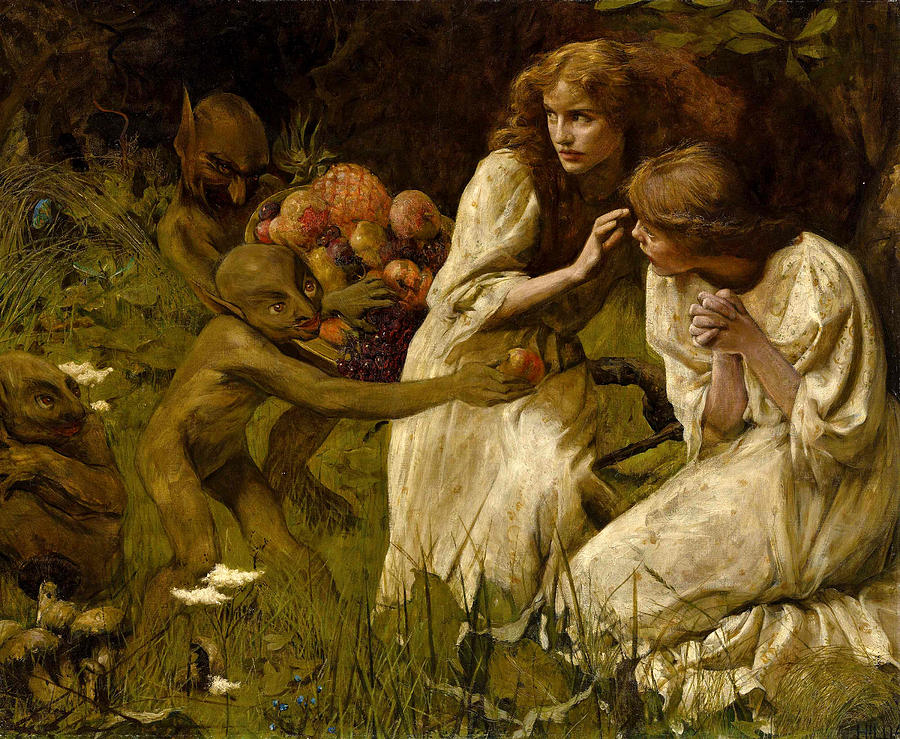ALICIA DORAN attends the reading of Goblin Market and other poems at The Josephine Hart Foundation’s Poetry Hour.
Novelist and poetry anthologist Josephine Hart began The Poetry Hour in 2004, with an aim “to make the public performance of the great poetry of the dead poets read by great actors the norm in London”. This month’s Poetry Hour at the British Library was themed around the current Fantasy: Realms of Imagination exhibition. My regret that this kind of event is more of a rare gem than a norm was tempered by how special the evening felt, with a palpable dedication to the magic of poetry read aloud from everyone involved.
The first of three purposes of The Poetry Hour is to introduce the life of the poet. This was done expertly by Dr Mary Wellesley, the foundation’s new director, who provided moving and personal biographies of each poet before the readings. This included Christina Rossetti’s conflicting religious and romantic lives as well as the childhood antics of Keats and Percy Shelley. The second purpose is to hear the poetry read aloud, and us audience members were reminded in the words of W. H. Auden that “No poem which is not better heard than read is good poetry.” A simple premise, but a valuable one.
The third purpose is to have poetry read by great actors, and it was a real pleasure to hear the texts so carefully and expertly brought to life, with vivid characterisation and well-timed pauses and crescendos. The standout reader of the evening was undoubtedly Shirley Henderson, best known as Moaning Myrtle in the Harry Potter films and Jude in Bridget Jones’ Diary. Her very distinctive and rather eerie voice will be familiar to anyone who has seen her on screen, and was perfectly suited to the surreal, sing-song tone of Rossetti’s Goblin Market. Her portrayal of the goblins (who are nefarious fruit-merchants in the poem) was particularly enjoyable, adding a chilling lilt to their menacing “come buy, come buy!” cries and applying a forceful growl in the poem’s more violent episodes. Since it was first published in 1862, Goblin Market has divided opinion as to whether it should be taken as a children’s fairytale or a darker story of sexual temptation — Kinuko Crafts’s gothic-erotic 1973 illustrations of the poem for Playboy are a notable example of the latter interpretation. Henderson’s rendition seemed to carry both of these moods, stylised and fun but with a discomfiting heaviness too. Joining Henderson in reading Rossetti was Felicity Jones, of Rogue One and The Theory of Everything fame, and the back-and-forth between two voices upped the suspense level. Goblin Market is such a seductive, unsolvable puzzle of a poem, a perfect choice for live performance as it sparkles and slips away before we have time to pin it down or pick it apart.
After Rossetti we were treated to a selection of Keats and Shelley poems, read by Mackenzie Davis and Patrick Kennedy, including La Belle Dame Sans Merci, Bright Star, excerpts from Endymion and Adonais, and finally Ozymandias. A (presumably unintentional) connection between the evening’s texts were that most feature on the English secondary-school syllabus; I know Goblin Market intimately from A-levels, while La Belle Dame will always transport me half to fairy-woods and half to to a Year 7 classroom, and Ozymandias is a stalwart of GCSE Power & Conflict anthologies. Having this fond familiarity with the poems made it all the more precious to hear them read artfully and energetically aloud, with no obligation but to listen. I left the British Library wishing we had a Dead Poets Society here at UCL.
Featured Image: The Goblin Market by Hilda Koe, 1895.





